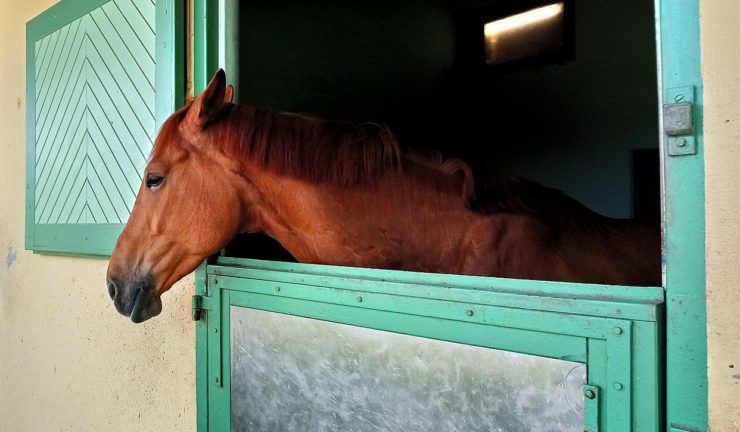One of the best pieces of advice I’ve seen for surviving in this dystopian hellscape is to do all the things to maintain social distance, avoid infection (both coming in and going out), and Take This Thing Seriously—but don’t give up on going outside. If you can get out in nature at all, safely and without endangering the public health, do it. Your body and mind both will thank you.
Even just looking up at the sky from your window or yard or balcony can help. There’s something about that movement that takes you out of yourself. It gives you a different perspective.
For horse people, the new normal is both much the same as the old normal, and replete with new challenges.
Horses still have to be fed, watered, cared for. Show and racehorses may be sidelined by the restrictions on crowds and contact, but they still need to get out and about, especially if their stabling doesn’t allow for release from their stalls except for work. Somehow, someone has to get out there and ride or exercise them, at least to be hand-walked or put on a hot walker—not only to keep them in shape for an eventual (one hopes) return to work, but because a horse in peak condition will go stir-crazy otherwise, and harm himself and anyone and anything around him.
Less high-maintenance horses need to keep up the routine, too, for their own health and safety. Routine is very important to a horse, and so is the ability to move around with as few restrictions as possible. The feed and water have to keep coming, and can’t vary too much if at all from meal to meal and shipment to shipment. Abrupt changes in feed can disrupt a horse’s digestive system in unfortunate and sometimes even fatal ways.
The worry for many horsekeepers right now is that supplies of hay and feed will be disrupted. The purveyors of stable and horse supplies are already warning that vendors will be shutting down, and urging customers to stock up while they can. I have not succumbed to toilet-paper panic, but I will confess, yesterday I panic-bought fly masks for all the horses. Just in case.
Owners who board their horses have another and looming worry: closure of the barns where their horses live. That doesn’t mean evicting the horses, but will mean that the barn closes to anyone who doesn’t live on the property. There’s a lot of trust in boarding your horse to begin with, but barn closure means not being able to visit or work the horse, and not being able to manage his care in person. Barn owners try to keep in touch, and may send photos or videos, but it’s not the same. And what if the horse gets sick or injured? The barn will have emergency orders on file from each other, and yet the owner can’t be there to comfort the distressed animal.
For the barn personnel on site, whether commercial barn or private facility, isolation is a huge responsibility, but it also gives a degree of comfort. You’re right there with your horses. You can even ride them—as with walking your dog, that’s a thing you can do that gets you outside and benefits both animal and human.
The other day when I saw a meme about “llama distancing,” operating on the principle that the length of a llama is just about the right distance to keep between humans, I realized that “horse distancing” is even better. If you’re not actually on the horse (and therefore nicely out of reach of casual contact), if you stay a safe distance in front of the end that bites, and an equally safe distance in back of the end that kicks, and well away from the Spinny Radius and the Sideways Levitation Zone, you’ll be just fine.
Stay safe, everyone. Stay healthy.
Judith Tarr’s first novel, The Isle of Glass, appeared in 1985. Since then she’s written novels and shorter works of historical fiction and historical fantasy and epic fantasy and space opera and contemporary fantasy, many of which have been reborn as ebooks. She has even written a primer for writers: Writing Horses: The Fine Art of Getting It Right. She has won the Crawford Award, and been a finalist for the World Fantasy Award and the Locus Award. She lives in Arizona with an assortment of cats, a blue-eyed dog, and a herd of Lipizzan horses.










